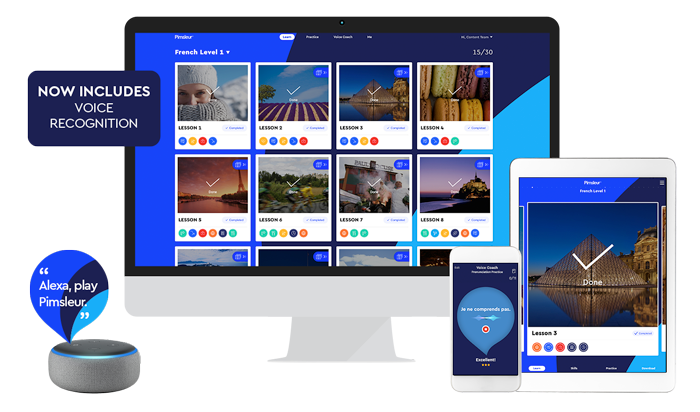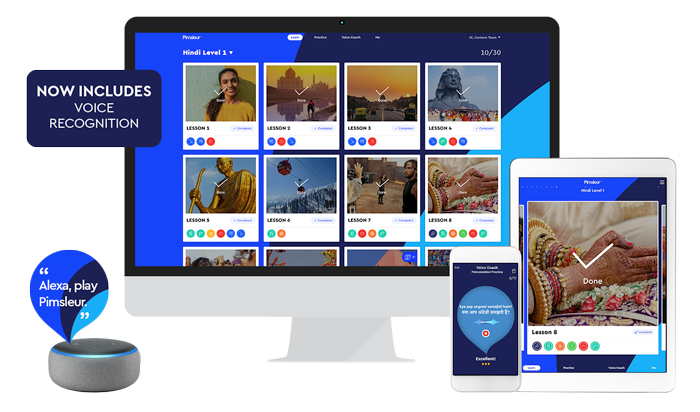10 Most Valuable Languages Of The Future To Learn (Besides English)
10 Most Valuable Languages Of The Future To Learn (Besides English)
Photo Credit: Jirsak/Getty Images
Affiliate Disclaimer: This post contains affiliate links. This means I will earn an affiliate commission if you click and/or make a purchase through the link (at no extra cost to you). And of course, I only recommend products I’ve used from companies I completely trust and love. For more information please see my disclosure.
What Is The Future Language To Learn?
Are you dreaming of becoming a globetrotter or climbing the career ladder in international business? Knowing which languages will open doors in the future might just be your golden ticket.
Yet, with so many languages out there, it's tough to pick which one to learn next. That's where we zoom into the picture!
Did you know that Mandarin Chinese is not just a language spoken by billions but is also soaring high on its way to being the most widely used language by 2050? This fact alone could steer your decision-making process towards what language to dive into next.
Our article is packed with insights and forecasts that will guide you through the linguistic landscape of tomorrow, equipping you for a world where communication barriers are tumbling down.
Get ready—your journey through languages of the future starts here!
The Evolution Of Languages
Languages constantly transform with time and influence. Think about ancient Latin, once widespread across Roman territories; now it lives on through its descendants like Spanish, French, and Italian.
Travelers, traders, and invaders have always carried their languages to new lands, mingling vocabularies and giving birth to fresh dialects. Digital communication is accelerating these changes faster than ever before.
Today's global village connects distant corners of the world in seconds. The internet serves as a melting pot where countless dialects and vernaculars mix. You might use emojis or internet slang that spans multiple languages without even realizing it!
As you move towards learning more about the crucial factors determining the language of the future, remember this fluid nature of human speech – always evolving just like us.
Crucial Factors Determining The Language Of The Future
The languages you choose to learn can unlock doors across different cultures and major economies. Economic development plays a crucial role in shaping the linguistic landscape of the future.
As businesses expand globally, they often adopt the language of influential market players. For instance, an upsurge in China's global economic status has driven millions to learn Mandarin Chinese.
Demographic shifts also have a profound impact on language prominence. Countries with booming populations contribute larger numbers of native speakers to the world stage.
Rapid population growth in Africa, for example, could lead to a surge in Swahili or other African languages being learned as second languages around the globe.
Technological trends are transforming how we communicate and which languages we prioritize learning. The rise of artificial intelligence and machine translation is making it easier than ever before to bridge language barriers without full fluency—a shift that might influence which languages people feel compelled to master.
Each of these factors—economic strength, demographic changes, and technology—is reshaping our approach towards foreign language education and acquisition today.
Let us glimpse at the top languages predicted to reign supreme by 2050 according to various forecasts and expert analyses.
Top 10 Languages Predicted To Dominate In 2050
1. Mandarin Chinese
Mandarin Chinese stands tall as a language of the future, with predictions placing it as one of the dominant forces by 2050. The growing significance is propelled by China's booming economy and its remarkable strides in technological innovation.
Learning Mandarin opens doors to international business opportunities, trades, and cultural exchanges that are invaluable in today's interconnected world.
China's influence isn't just growing in markets and tech; it's expanding on the global stage, compelling governments and educational institutions to encourage Mandarin learning.
As more Chinese tourists explore the world and immigration expands communities abroad, practical reasons for acquiring Mandarin skills multiply each day.
2. Spanish
Imagine being able to speak with 577 million people around the world. That's the power of Spanish, a language that opens doors across continents. As an official language in 21 countries, it plays a crucial role in global communication and business ties.
The economic rise of Spanish-speaking nations is pushing this beautiful Romance language into the spotlight as one of tomorrow's dominant languages.
Look at the United States—Spanish thrives here with over 41 million native speakers and countless bilingual people adding to its influence every day. Learning Spanish not only lets you connect with the growing Hispanic community stateside but also gears you up for international career opportunities.
Plus, if culture and history move you, diving into Spain or Latin America's rich heritage through their native tongue makes those experiences even more vivid and personal.
3. French
Transitioning from the widespread influence of Spanish, let's shift our focus to another global powerhouse language: French. Often associated with culture and sophistication, it stands out as a pillar of the linguistic community.
With official status in 29 countries that span almost every continent, French weaves through international borders like few other languages do.
In offices across Africa to classrooms in Europe, you'll hear the harmonious tones of French spoken by millions. It’s not just about romantic Parisian streets or haute cuisine; French holds a key place in global communications and business dealings worldwide.
The language caters to over 89 million tourists per year flocking to France alone, highlighting its cultural magnetism and economic clout.
Looking ahead, experts see a luminous future for French. Its usage on the internet comprises 3% globally—no small feat for any language in today’s digital age.
Recognized already within numerous African nations and international organizations as an official language, French is gearing up for even more expansive reach by 2050, potentially climbing atop the list as one of the most spoken languages around the globe.
4. Hindi
Hindi stands as a titan among the world's languages, boasting over half a billion native speakers in India alone. It extends its reach beyond borders, sharing close ties with Urdu and collectively known as Hindi-Urdu.
This combined linguistic force resonates through South Asia, holding official status in three countries: India, Pakistan, and Fiji. As you dive deeper into learning Hindi, you'll uncover the rich layers of culture that come alive in Bollywood films and Indian literature.
Your journey to mastering Hindi won't just open up conversations with hundreds of millions of speakers; it will also immerse you in cultural nuances unique to one of the world's oldest civilizations.
With 341 million people speaking it natively and another 274 million using it as a second language, your language skills could connect you to an expansive community across continents.
Learning Hindi places you at the heart of South Asia’s dynamic blend of traditions, business opportunities and technological innovations – all parts of India's rapidly growing global influence.
Diving into this vibrant language offers far more than just practical communication benefits; it becomes a gateway to understanding diverse lifestyles within India’s bustling cities and tranquil countryside.
Whether engaging with local markets or navigating digital platforms increasingly tailored for Hindi users, proficiency in this language equips you with tools essential for personal enrichment and future career prospects amidst India’s flourishing economy.
5. Arabic
Arabic stands out as a major player among future languages, with its influence sprawling across continents and cultures. With around 315 million native speakers today, Arabic is not just widely spoken; it's also the liturgical language for over a billion Muslims worldwide.
Its use goes beyond daily interactions—it's deeply woven into the fabric of many societies' cultural heritage.
Imagine navigating the bustling streets of Cairo or striking up business deals in Dubai—knowing Arabic opens doors to rich history and opportunities in some of the world’s fastest-growing economies.
Recognized as an official language in 22 countries, Modern Standard Arabic extends your reach across nations like Egypt, Algeria, Sudan, Saudi Arabia, and Morocco.
The ability to communicate in Arabic will connect you with diverse communities and lead you to uncover hidden gems within Middle Eastern markets.
6. German
German stands out as a pivotal language for those with their sights set on international business. With Germany's robust economy and influence within the European Union, speaking German not only opens doors to opportunities in one of the world's largest economies but also connects you to a heritage of innovation.
Whether you're aiming for a career in engineering, renewable energy, or the automotive industry, this language can give you an edge.
If you learn German, you'll gain access to an array of cultural experiences and resources that are predominantly available in German. Diving into the linguistic depths of Goethe and Schiller will enrich your understanding well beyond what translations can offer.
Moreover, Germany’s central role in Europe makes it imperative for diplomatic relations and navigating EU regulations – essential knowledge if your aspirations include international law or politics within Europe.
7. Portuguese
Portuguese stretches far beyond the borders of Portugal, reaching across continents to unite more than 221 million speakers worldwide.
As the official language in rapidly growing economies like Brazil and Angola, learning Portuguese opens doors in both international relations and global business sectors.
Imagine being able to communicate fluently with an entire hemisphere where Portuguese serves as a bridge from South America's largest country all the way to parts of Africa and Asia.
The cultural richness and economic potential of these nations are drawing increasing attention from multinational companies. They're expanding into Portuguese-speaking markets, searching for talent that can navigate these cultures with ease.
If you master this language, you position yourself at a vantage point in industries as diverse as natural resources in Mozambique or tech startups blooming in Lisbon.
Your proficiency could lead to exciting career paths while enriching your understanding of a varied tapestry of traditions tied together by this lyrical language. Get ready for new opportunities that await when you add Portuguese to your linguistic toolkit.
8. Japanese
The Japanese language holds a significant place in the tech world due to Japan's leadership in robotics and artificial intelligence. If you're keen on technology and innovations, learning Japanese could be a strategic move for your career.
As the most spoken language within its borders, with over 128 million speakers, Japanese paves the way into understanding not just the language but also the rich culture that influences global trends.
Imagine reading innovative research papers or participating in cutting-edge development projects – knowledge of Japanese can make this possible.
The influence of Japan's economy reaches far beyond its geographical limits as it stands tall among global market leaders. Whether you're interested in video games, anime, or luxury goods, proficiency in Japanese will open doors to these thriving industries.
Engaging directly with native speakers could give you an edge as companies often appreciate direct communication without linguistic barriers.
Consider adding Japanese to your skillset if you aim at being part of future technological advancements. It’s more than just another language; it’s a gateway into one of the world's largest economies and an insight into cultural phenomena that reverberate around our planet.
9. Russian
Russian isn't just the eighth most spoken language globally; it's the largest native language across Europe, making waves from Moscow to Berlin.
With around 258 million speakers, its reach extends far beyond Russia's borders, spilling into Belarus, Kazakhstan, Kyrgyzstan, and Tajikistan where it holds official status.
Its influence stretches even further into former Soviet territories like Ukraine and Baltics—nations where Russian words mingle with local dialects daily.
As you dive into this powerful language of international diplomacy and trade, you join a vast network of speakers playing key roles in global affairs. Learning Russian opens doors to opportunities in politics or business with one of the world’s leading natural gas exporters.
It also equips you with unique insights into Eastern European culture and history—a treasure chest for curious minds seeking more than mundane tourist experiences.
10. Korean
Imagine navigating the future of technology and engaging with a global community that's passionate about innovation. Learning Korean can be your gateway into this dynamic world, where South Korea stands at the forefront of cutting-edge developments.
This language is gaining traction in the business world as its economy continues to make waves globally, particularly in tech sectors.
Dive into the vibrant culture behind K-pop and Hallyu, or Korean Wave, which sweeps across continents bringing new fans into its fold every day. Your proficiency in Korean could open doors to understanding and participating in this cultural phenomenon more deeply.
As South Korea's influence grows in entertainment and technology, so does the value of mastering their native language for personal growth and professional opportunities.
Factors Influencing The Popularity Of Future Languages
Population Growth
Population growth is a powerful force that shapes the future of languages. As the number of people speaking a particular language increases, so does its global influence and usefulness for communication.
Consider Mandarin Chinese; with an expected surge to nearly 1.2 billion native speakers by 2050, learning this language could open up countless opportunities in various sectors.
The rise in the Indonesian-speaking population is also noteworthy, as it's projected to expand by more than 200%.
Such significant growth elevates the importance of these languages on the world stage and can affect your decisions about which new language might benefit you most professionally and personally in the years ahead.
Economic Growth
Economic growth shapes the languages you might want to learn. As powerful economies expand, their languages often spread with them. Take Mandarin Chinese, for instance; it's closely tied to one of the world's fastest-growing economies.
By 2050, nearly 1.2 billion people are expected to speak it natively. This implies a rise in businesses and cultural interactions where Mandarin will play a crucial role.
Learning Spanish also offers advantages as its speakers are set to increase by 44% due to economic influences from Spain and Latin America. If you're aiming for a business or diplomatic career, speaking these languages could open many doors.
It’s not just about numbers; economic power can make a language like Hindi crucial as India's economy continues on an upward trajectory.
Globalization
As economies grow, the world becomes more interconnected, and globalization accelerates this process. It shapes not just markets but also how we communicate across different countries.
Take English, for instance; although it's the third most spoken language globally, it has become the lingua franca in international communication because of widespread global ties. This shows in business deals, social media exchanges, and even entertainment.
Globalization influences which languages spread and persist through cultural influence and migration patterns. Think about Spanish – its speakers are set to surge by 44% come 2050 partly due to global economic connections tying Spanish-speaking countries to the rest of the world.
With nearly 700 million native speakers expected in Europe alone by then, learning Spanish could keep you ahead of the curve as populations shift and new regions gain prominence on the global stage.
Understanding these trends is crucial as they alter our approach to language learning today. Being fluent in a language like Spanish or English can open doors worldwide as they play a key role in bridging diverse communities together under an intertwined economy.
Whether planning a trip abroad or looking to expand your career internationally, consider how globalization affects your choice of which new language to learn next!
Technological Advancements
Technological advancements shape the world today and have a significant impact on the languages we prioritize. Consider how Japan's expertise in robotics and artificial intelligence makes Japanese an increasingly valuable language to learn.
As Japan continues to lead in these critical tech fields, learning Japanese could open up remarkable opportunities for you in cutting-edge industries.
Another vital aspect is information technology, where English has become the predominant internet language. Your ability to communicate effectively in English can connect you with global business operations, innovation hubs, and online communities across various sectors.
With these skills, your career potential expands as you navigate through international markets and collaborate with professionals from around the world.
Influence Of Pop Culture
Pop culture often sets trends, including the spread of languages across borders. Hit songs and blockbuster movies can introduce new phrases and slang, making certain languages more appealing to global audiences.
Imagine millions singing along to Spanish hits by Daddy Yankee or Bad Bunny; this music shares not just catchy tunes but also pieces of language that fans are eager to learn and use.
TV shows and films have a similar effect. They transport viewers into different cultures, sometimes sparking interest in learning a new language.
RELATED: How To Learn A Language By Watching TV: The 13 Best Tips & Resources.
Consider how K-dramas have fueled curiosity for Korean or anime has done the same for Japanese—both genres have dedicated fan bases eager to understand every word without subtitles.
RELATED: LingoPie Review: The #1 Streaming Service To Help You Learn A Language.
This cultural wave creates a natural pull toward languages that dominate pop culture, shaping what you might choose as your next language adventure.
The Impact Of Learning Future Languages
Career Opportunities
Mastering languages projected to flourish in the future could be your ticket to a world of career possibilities. Imagine conversing fluently in Mandarin, harnessing China's economic explosion for business ventures or diplomatic relations.
Your proficiency in this language might open doors to high-powered meetings in Beijing or managing trade deals that shape global markets.
RELATED: The Top 13 Most In Demand Jobs For Bilinguals You Should Know!
Dive into learning Spanish and access job opportunities not only across Latin America but also within the United States, where it serves as a bridge for communication and cultural connections.
From international marketing to tourism, speaking Spanish is becoming indispensable. Similarly, French isn't just about savoring the Parisian lifestyle; it unlocks professional roles across various industries around the globe.
RELATED: The 10 Best Languages To Learn For Business That Are High In Demand.
Expand your horizons with Portuguese to engage with Brazil’s growing market and beyond, fostering international partnerships while experiencing rich cultural exchanges. And if technology captivates you, Korean skills can pave your path into South Korea's innovative tech scene.
With each new language learned, envision yourself breaking barriers and crafting a vibrant career on an international stage.
Cultural Understanding
Exploring different languages opens doors to new worlds, traditions, and ways of thinking. It allows you to appreciate the beauty and complexity of other cultures in ways that tourists or casual learners never will.
You begin to understand the subtleties that shape a community's mindset, values, and traditions. Delving into local expressions and slang teaches you about the humor and character of people from various backgrounds.
As you become more proficient in these languages, cultural nuances that once seemed foreign start making sense. This understanding can turn into respect for diversity and contribute to overcoming cultural barriers.
When traveling abroad or engaging with international clients, your language skills help build rapport and trust because you're acknowledging the importance of someone else's native language.
Moving forward with this wealth of knowledge helps create deeper connections within our global network.
Global Networking
Mastering a new language paves the way for powerful global networking opportunities. You bridge cultures and break barriers, enabling you to form connections with people from different corners of the world.
Learning languages like Mandarin, Spanish, or Arabic can open doors in countries that are central to the global economy. Imagine negotiating a business deal in China or discussing a project with partners in Spain; your language skills could be the key factor that sets you apart.
As English has cemented its role as the lingua franca through globalization, being fluent can help establish common ground with native English speakers and non-native speakers alike.
Yet, embracing other languages enriches interactions and offers deeper insights into diverse ways of life. With technology progressing rapidly, online platforms provide endless possibilities to connect with international peers and experts across various fields.
This ease of communication enhances cultural understanding and fosters collaborations that were once hindered by language barriers.
Future Predictions: Languages That Will Dominate In 2050
Mandarin Set To Have Almost 1.2 Billion Native Speakers By 2050
Mandarin's dominance in the global linguistic landscape is skyrocketing, poised to expand its reach even further. With China continuing on a trajectory of rapid economic advancement, Mandarin becomes not just a language but a bridge to one of the world's largest economies.
Learning this language offers you insider access to numerous opportunities that span international trade, diplomacy, and cultural exchange.
The staggering number of nearly 1.2 billion native speakers by 2050 makes Mandarin an irresistible asset for anyone looking to thrive in the near future's globalized marketplace.
As Mandarin cements itself as a primary language for business and communication across continents, your proficiency could unlock doors around the globe.
Leverage this wave of change; immerse yourself in learning Mandarin now and position yourself at the forefront of tomorrow’s opportunities.
Indonesian Projected To Grow Significantly
Indonesian stands out as a language on the rise, with projections indicating an impressive increase in native speakers by 2050. The language's potential expansion stems from several factors, including Indonesia's growing population and the nation’s economic climb.
As one of Southeast Asia's most significant economies, Indonesia draws global business, creating avenues for the Indonesian language to resonate across international markets.
The allure of Indonesian culture also plays a vital role in this linguistic surge. Pop music and entertainment from Indonesia have started gaining traction worldwide, sparking curiosity and eagerness to engage with the Indonesian language.
Furthermore, as tourism flourishes thanks to Indonesia's enchanting landscapes and rich heritage, more people find themselves drawn towards learning this fascinating language.
Demand for resources and education in the Indonesian language is expected to escalate alongside its popularity. Whether pursuing careers influenced by Southeast Asia’s market dynamics or simply exploring vibrant cultural vistas through travel – mastering Bahasa Indonesia could unlock new opportunities.
As such, many are keeping a keen eye on this emerging linguistic powerhouse within today's ever-evolving tapestry of global communication.
Decline In German Speakers While Spanish Remains Dominant In Europe
Shifting our focus to Europe's linguistic landscape, a stark contrast emerges between the trajectories of German and Spanish. Experts predict a significant dip in the number of German language speakers, with expectations indicating a 35% decrease by 2050.
This decline paints a concerning picture for the future prevalence of German across European nations, including Germany itself.
Meanwhile, Spanish is bucking this downward trend and is poised to tighten its grip as Europe's second titan alongside English. With an anticipated surge to nearly 700 million native speakers globally by mid-century, it retains its stronghold as one of Europe's most widely spoken languages.
The persistent dominance of Spanish offers language learners unique advantages for cultural immersion and career opportunities across diverse regions from Spain to South America.
Welsh And Manx Languages Expected To Increase
You might be surprised to learn that Welsh, the ancient language of Wales, is on the rise. Thanks to Cymraeg 2050, a strategy launched by the UK government, there's an ambitious plan to increase Welsh speakers by 32% come 2050.
This initiative is sparking new interest and providing resources for people eager to embrace this vibrant part of British cultural heritage.
Manx is another Celtic language making a surprising comeback. Once at risk of fading away, Manx has found new life as schools in the Isle of Man weave it into their curriculum.
Government support has been key in this revival, with projections showing that Manx speakers could double within the next few decades.
So if you're looking at adding a unique language to your repertoire, consider diving into Welsh or Manx – they're not just languages of the past but are carving out their place in our global future.
The Benefits Of Learning The Languages Of The Future
Diving into the languages predicted to flourish can open a world of opportunities for you. Learning Mandarin Chinese, projected to grow in speakers by 2050, positions you at the forefront of engaging with the largest economy and one-third of the global population.
Imagine negotiating business deals or forming partnerships with ease because you speak the same language as your international colleagues.
Grasping Spanish gives you access to almost 700 million people by mid-century, including those in rapidly growing economies such as Mexico and Argentina.
RELATED: 10 Amazing Benefits Of Learning A Second Language That Will Shock You.
This knowledge not only fuels professional growth but also enriches personal experiences, allowing deeper connections with diverse cultures across several continents from Europe to South America.
As economies intertwine and our social landscapes diversify, being proficient in these influential languages could become an invaluable asset for anyone looking to thrive in a globalized world.
The Impact Of Future Languages On Global Communication
As the number of native speakers for languages like Mandarin, Spanish, and Arabic continues to climb, these languages will shape how we connect globally.
Imagine a world where business deals hinge on proficiency in Portuguese or Hindi, where cultural insight depends on understanding nuances in Korean pop lyrics, and global travel requires a phrasebook filled with local dialects.
The rise of future languages will create new leaders in international dialogue and shift the way nations interact.
Knowledge of emerging dominant languages equips you with a key to unlock doors in diverse fields such as diplomacy, international trade, and cross-cultural collaboration. It's not just about getting by as a tourist—it's about thriving in an increasingly interconnected economy where multilingual communication is not just beneficial but essential.
As you ponder which language might serve your goals best, consider how each one could amplify your voice on the world stage.
How To Choose A Language To Learn
Choosing a language to learn can shape your future, opening up new opportunities and experiences. Think about your interests, goals, and the trends shaping global communication before making a decision. Here's how to navigate the selection process:
Consider personal interest - Pick a language that fascinates you or relates to cultures you enjoy exploring. Learning is smoother when you have a passion for the subject.
Look at career prospects - Research which languages could benefit your profession. Sectors like tourism, diplomacy, and international business value polyglots highly.
Assess economic growth - Languages from rapidly developing economies like those in the BRICS countries might offer more job opportunities in the coming years.
Check cultural influence - Global pop culture often dictates trendy languages. Recently, Korean has spiked in popularity due to K-Pop and Korean dramas.
Gauge difficulty level - Be realistic about how much time you can invest in learning. Some consider Chinese or Arabic as some of the most challenging languages due to their unique writing systems and pronunciation.
Recognize speaker dominance - Assess whether a language has a high number of native speakers like Mandarin or Spanish, enhancing its global usefulness.
Understand globalization trends - A diverse language experience can be vital as businesses become more globalized; proficiency in multiple languages may set you apart.
RELATED: Is It Really A Good Idea? How To Learn Multiple Languages At Once.
Anticipate future growth - Investigate predictions, like the rise of Indonesian speakers or the decline of German-speaking populations, to choose a language with longevity.
Reflect on travel plans - If you love traveling, think about tourist destinations where being bilingual could enhance your experience—for instance learning Portuguese if you plan to visit Brazil or Portugal.
Review the availability of educational resources - Certain languages might have more accessible learning materials and communities that can support your journey towards fluency.
RELATED: What Language Should I Learn? Take The Quiz To Find Out.
Conclusion
As you stand on the brink of a globalized future, learning languages will unlock doors worldwide. Imagine conversing fluently in Mandarin, weaving through the economic powerhouses of East Asia, or sharing ideas in Spanish across countless Latin American cultures.
Acquire these invaluable linguistic tools and witness a proliferation of career opportunities, a profound expansion of cultural understanding, and a network that spans across continents.
Immerse yourself in a wealth of resources that will guide you on your multilingual journey. Explore books, apps, and courses that are ready to elevate your language proficiency to new heights.
Let each new word learned be a step towards a broader horizon. Embrace these languages of tomorrow; they are keys to worlds waiting for you to explore!
A TINY REQUEST: IF YOU LIKED THIS POST, PLEASE SHARE THIS?
Ready to have some fun learning a new language? Then take action on what you just learned - you’ll be glad you did! Be a good friend and share this post on social media.
Also, share this post with anyone you know who’s looking to learn a foreign language! Just think how good you’ll feel when your friends thank you for bringing them insight and some surprising discoveries about language learning!
I know most people don’t share because they feel that us bloggers don’t need their “tiny” social share. But here’s the truth…
I built this blog piece by piece, one small share at a time, and will continue to do so. So thank you so much for your support, my reader.
A share from you would seriously help a lot with the growth of this blog.
Some great suggestions:
Pin it! (I even made a pretty pin for ya!)
Share it to Facebook
Tweet it!
Flip it on Flipboard
It won’t take more than 10 seconds of your time. The share buttons are right here.:)
Thank you so much!
Question:
So, here’s the question: Was there any language on this list that surprised you? Are you currently learning any of these languages on this list? If so, which one and why are you learning that language? Let us know in the comments section down below!
P.S. I want to hear from you today. No for real, get out from behind that keyboard and tell us more about yourself! Use the comment section down below and introduce yourself.
Hey, I’m Mara.
I am the founder and blogger of Sololingual helping anyone at any age, from any place, who wants to learn a new language. You can learn how to reach fluency in your chosen language fast, fun and easily studying a short amount each day and spending very little money using different language learning techniques, programs and resources at your disposal. Fluency isn't difficult to achieve. In fact, it’s easy when you find a solid method that walks you through every step of the way, and believing in yourself so that you can achieve your goal at becoming fluent in any language.



































